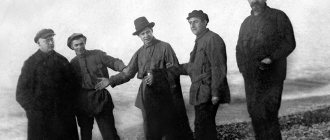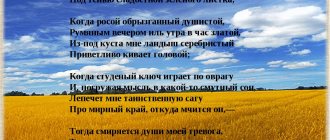An analysis of the poem “Now we are leaving little by little” by Sergei Yesenin will help schoolchildren while studying the work. The verse was written in the late period of the poet’s work. At that time, Sergei Alexandrovich could not come to terms with the reality around him and therefore was very worried. He had a deep internal crisis, which led to the creation of the work.
Brief Analysis
The poem “We are now leaving little by little” should be analyzed according to plan:
- History of creation - the poem was written in 1924 under the impression after the death of Shiryavtsev, his friend the poet. This event greatly impressed Yesenin, who was already going through a difficult period in his life.
- The main theme of the poem is love of life and awareness of the inevitability of death. As a result, the author argues that a person should enjoy every moment of it.
- The composition is conventionally divided into 3 parts. The first talks about the theme of the poem, then the poet indulges in memories. The last part reflects the desire to live and love. The verse consists of 7 quatrains.
- By the type of literature, the work belongs to philosophical lyrics. Genre: ballad or song.
- Meter: trochee pentameter. The work was created by alternating precise and imprecise rhyme.
When writing, the poet used many means of expression. These include metaphors, alliteration and personification.
History of creation
The verse was written by Sergei Yesenin in 1924. At this time, the author was depressed and disappointed in the world around him. The reality was not too happy for him. The poet could not accept the order established by the new government, and therefore felt lonely. All the works created during that period touched on the theme of doom in one way or another and described the desire to find oneself in the new, Soviet world . The poet’s experiences worsened after the news of the death of his friend, poet Alexander Shiryavtsev. Yesenin's worries are reflected in this poem.
Sergei turns to the earth and his favorite places in an attempt to rethink his current existence.
Main theme
The main theme of the work is the problem of life and death. The poet understands: all those moments that he managed to live and feel on his way are very dear to him. He is happy, because all this was once with him. The love for life is visible in how touchingly and with nostalgia Yesenin recalls: “Lovely birch groves!” The author seems to idolize all the beautiful things that exist in this world.
Sergei describes death, calling it a country where peace and grace reign. He contrasts it with earthly life, saying that the world around is still very gloomy. The Creator also does not hide his fear of death. He seems to convince the reader to enjoy every day and not waste his life.
“Now we are leaving little by little...” S. Yesenin
“Now we are leaving little by little...” Sergei Yesenin
We are now leaving little by little To that country where there is peace and grace. Maybe soon I’ll have to pack my mortal belongings for the road.
Lovely birch thickets! You, earth! And you, plain sands!
Before this host of departing ones, I am unable to hide my melancholy.
I loved too much in this world Everything that puts the soul into flesh. Peace to the aspens, who, spreading their branches, gaze into the pink water.
I thought through many thoughts in silence, composed many songs to myself, and on this gloomy earth I was happy that I breathed and lived.
Happy that I kissed women, crushed flowers, lay on the grass, and never hit animals on the head, like our smaller brothers.
I know that the thickets do not bloom there, the rye does not ring with a swan's neck. That is why I always tremble before the departing host.
I know that in that country there will not be these fields, golden in the darkness. That is why people are dear to me, That they live with me on earth.
Analysis of Yesenin’s poem “Now we are leaving little by little...”
Sergei Yesenin foresaw his own death several years before the tragic events at the Leningrad Angleterre Hotel. This is evidenced by the poet’s poems, filled with sadness and a sense of the inevitability of everything that happens. The refrain about imminent death is present in them with enviable consistency, starting from mid-1923, when the poet suddenly realized that his youth was in the past, and the future did not promise him anything new and exciting.
In 1924, Yesenin published the poem “We are now leaving little by little...”, permeated with the spirit of decadence and pessimism. One feels that the author is internally preparing for death, although he does not directly talk about it. However, mentally he says goodbye to places dear to him, Fr. It should be noted that the poem itself was written under the impression of the death of the poet Alexander Shiryaevets, who suddenly died of meningitis at the age of 37. He was one of Yesenin’s bosom friends, so the poet perceived his death as a personal tragedy, drawing the appropriate conclusions from it: “Maybe I’ll be on my way soon.”
In this work, the author admits that he thought a lot about his own life, which he considers quite successful. However, Yesenin does not classify himself as a person who clings to every moment of existence in this mortal world . He even talks about himself in the past tense, oh. Imagining life after death, the poet with inner trembling about. Therefore, the prospect of sinking into oblivion seems depressing to him. Alexander Shiryaevets has already crossed this line, before which Yesenin experiences real panic. Nevertheless, the author understands the inevitability of death and feels that very soon he will become its next prey. Therefore, every moment of earthly life takes on a special meaning for him. After all, beyond the line that Yesenin has already approached, the unknown awaits him, although the author himself is convinced that there is darkness, cold and emptiness. The poet does not believe in the immortality of the soul and does not strive for eternity . realizing that it is meaningless without beloved fields and rivers, without aspens and birches, purple clusters of rowan berries and nightingale trills. But most of all, Yesenin is afraid that he will never meet those who have been with him all these years. “That’s why people are dear to me because they live with me on earth,” the poet notes, saying goodbye not only to his friend, but also to life itself.
Composition and genre
The work includes 7 stanzas written in quatrains. The composition itself can be divided into 3 parts:
- At the beginning, the poet shares with the reader information about what will be discussed further in the poem. He reports that death awaits everyone in any case and cannot be avoided.
- In the second part, Sergei expresses his love for life, the world around him and indulges in memories of what happened in it.
- At the end, the mood of the poem changes. Sadness, having reached its epic level, gives way to hopes for improvement, and the author describes his attachment to life. He is afraid to leave her, and the people around him seem too dear to part with. The author does not want to know what is there on the other side of the world. But something tells him that the thickets do not bloom there and that peace and grace do not reign. That is why life and the people around him are dear to him.
The poem can be classified as philosophical poetry. Because of this, it is impossible to accurately determine the genre. Due to its smooth sound, it can be classified as a song or ballad.
When writing the poem, Sergei Alexandrovich used trochee pentameter. The lines rhyme crosswise (ABAB). Rhyme is used both precise and imprecise.
Composition
The poem consists of seven stanzas. Conventionally, it can be divided into several parts. In the first, the poet, in an allegorical form, makes it clear what he wants to tell the reader: that death is inevitable, and all people will have to go “to that country where there is peace and grace.” Then he expresses his love for life and the world around him, memories. In the penultimate stanza, the author comes to the idea of the inevitability of what he fears: “That’s why I always tremble before the host of people leaving.” In the next and last four lines the mood changes dramatically. Sad, reaching its climax, it suddenly reflects hope, attachment to this life, to others. “That’s why people are dear to me...” says Yesenin, summing up his inner experiences.
Means of expression
The author used various artistic means in the poem. Among them:
- metaphors - “thickets are blooming”, “fields golden in the darkness”, “rye does not ring with its neck”;
- personifications - “the aspens that looked into the pink water”;
- epithets - “pink”, “perishable”, “sullen”;
- In the line “Rye does not ring the swan’s neck,” Yesenin used alliteration. By repeating the hissing sounds, the rustling of the spikelets is conveyed.
Sergei Alexandrovich also used outdated words such as “host”. He chose his artistic means very well. With their help, the author accurately and poetically created the image of a lyrical hero, a man yearning for the old days .
Analysis of Yesenin’s “We are now leaving little by little” describes the author’s state at the time of writing and reveals the features of the poem.
“Now we are leaving little by little,” analysis of Yesenin’s poem
Imbued with the sadness of farewell, the philosophical poem “Now we are leaving little by little” was created by Yesenin after a sad event - the death of the poet Alexander Shiryaevets. The two talented people did not know each other personally for several years: they recognized each other through poems and letters, the meeting took place only in 1921. Further personal communication and a similar way of thinking did not make Yesenin and Shiryaevets closest friends, but the latter’s death - sudden, from a transient illness - shocked Sergei Alexandrovich. This shock made him look differently at his own life and the years he had lived; in the manuscript, the poem written on the death of Shiryaevets was even entitled: “To peers.” And the mood in it is detached and sad, reminiscent of a bright epitaph, which, in essence, the work is. Its genre is lyrical-philosophical; when read aloud, the poem is very reminiscent of a song: a pentameter trochee with unstressed feet in each line gives rise to melodiousness and smoothness of sound. Appeals and exclamations in the second stanza are also a technique more typical of ballads; they enhance the emotionality of the lines. Numerous anaphoras (“many”, “happy”, “I know”, “that’s why”), seemingly scattered in the second half of the work, emphasize the lyrical mood; when reading them, you can even hear the plucking of guitar strings. It is not for nothing that they tried to set these lines to music during the poet’s lifetime. The composition of the poem is also built smoothly: in the first stanza there are introductory words, hinting to the reader about what particular event brought these lines to life. “We are now leaving little by little” - a generalizing pronoun equates everyone, both those who have already left this world and those currently living, since all people are mortal. Next, the author moves on to reflecting on himself and his love for life. The second and third stanzas are devoted to chanting the beauty of the earth: the emotional appeal to inanimate objects fully conveys the melancholy that grips the poet at the thought of farewell, and at the end of the second stanza he directly names this feeling. Thinking out loud, talking to yourself becomes more frank and thoughtful. Why is life so precious? Why is it so hard to say goodbye? These questions are not in the poem, but the answers are given in abundance. To be happy simply because I “breathed and lived” is a rare gift, but the author was given it, despite all the difficult periods of life. The enumeration of joys out loud (“kissed women,” “rolled on the grass,” “crushed flowers”) seems to rediscover their charm for the author, bringing him back to himself, unspoiled by bohemian life and revelry. And the line that concludes the fifth stanza, with its simplicity standing out from the general sublime mood (“never hit you on the head”), confirms that in this poem there is no philosophizing or prettiness, that all the words come from the soul, immediately onto paper... From the memories of In the simple joys of life, the author again returns to philosophizing, trying to convey his vision of the afterlife. But he does not talk about what awaits a person “in that country,” but regrets what will not happen. Beautiful metaphors (“the thickets are blooming,” “the fields are turning golden,” “the rye is ringing with the swan’s neck”) express even greater bitterness from the upcoming farewell to the world than at the beginning of the poem. In the penultimate stanza, the composition closes in a ring: the “host of those leaving” and the melancholy and trembling associated with it are again mentioned. There is a feeling of doom in these words, its intensity reaching its climax. And the last four lines - as if taken out of brackets, their mood contradicting the sadness of the inevitable farewell - “that’s why the people who live on earth are dear to me.” These words are a hymn to life, a call to love it here and now, until you join the “host of those leaving.” The last stanza is both a climax and a finale, lifting the reader from melancholy to bright sadness and then to the hope of living life to the fullest, cherishing every moment. This farewell call makes the entire poem bright, devoid of despondency, but at the same time reminiscent of the final line of existence - like the best possible epitaph.
Similar articles:
Yesenin S.A. → Analysis of the poem by S.A. Yesenin “Blue fog. Snow expanse"
Yesenin S.A. → Analysis of S. Yesenin’s poem “Letter to Mother”
Yesenin S.A. → Analysis of the poem by S.A. Yesenin “I don’t regret, I don’t call, I don’t cry”
Yesenin S.A. → Analysis of S. Yesenin’s poem “The golden grove dissuaded me.”
Yesenin S.A. → Analysis of S. Yesenin’s poem “Stanzas”








